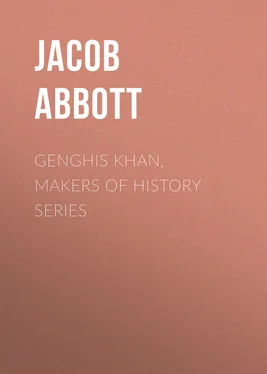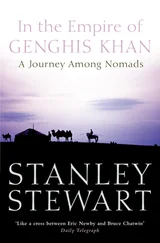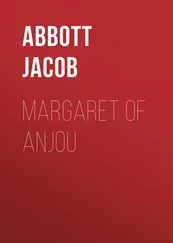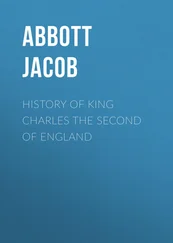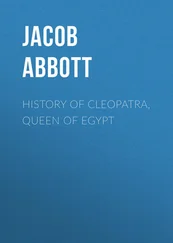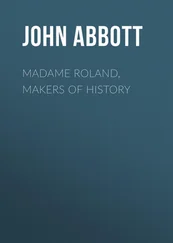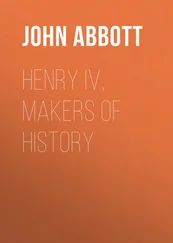Jacob Abbott - Genghis Khan, Makers of History Series
Здесь есть возможность читать онлайн «Jacob Abbott - Genghis Khan, Makers of History Series» — ознакомительный отрывок электронной книги совершенно бесплатно, а после прочтения отрывка купить полную версию. В некоторых случаях можно слушать аудио, скачать через торрент в формате fb2 и присутствует краткое содержание. ISBN: , Жанр: foreign_antique, foreign_prose, на английском языке. Описание произведения, (предисловие) а так же отзывы посетителей доступны на портале библиотеки ЛибКат.
- Название:Genghis Khan, Makers of History Series
- Автор:
- Жанр:
- Год:неизвестен
- ISBN:http://www.gutenberg.org/ebooks/28667
- Рейтинг книги:3 / 5. Голосов: 1
-
Избранное:Добавить в избранное
- Отзывы:
-
Ваша оценка:
- 60
- 1
- 2
- 3
- 4
- 5
Genghis Khan, Makers of History Series: краткое содержание, описание и аннотация
Предлагаем к чтению аннотацию, описание, краткое содержание или предисловие (зависит от того, что написал сам автор книги «Genghis Khan, Makers of History Series»). Если вы не нашли необходимую информацию о книге — напишите в комментариях, мы постараемся отыскать её.
Genghis Khan, Makers of History Series — читать онлайн ознакомительный отрывок
Ниже представлен текст книги, разбитый по страницам. Система сохранения места последней прочитанной страницы, позволяет с удобством читать онлайн бесплатно книгу «Genghis Khan, Makers of History Series», без необходимости каждый раз заново искать на чём Вы остановились. Поставьте закладку, и сможете в любой момент перейти на страницу, на которой закончили чтение.
Интервал:
Закладка:
Chapter III
Yezonkai Khan
The name of the father of Genghis Khan is a word which can not be pronounced exactly in English. It sounded something like this, Yezonkai Behadr , with the accent on the last syllable, Behadr, and the a sounded like a in hark . This is as near as we can come to it; but the name, as it was really pronounced by the Mongul people, can not be written in English letters nor spoken with English sounds.
Indeed, in all languages so entirely distinct from each other as the Mongul language was from ours, the sounds are different, and the letters by which the sounds are represented are different too. Some of the sounds are so utterly unlike any sounds that we have in English that it is as impossible to write them in English characters as it is for us to write in English letters the sound that a man makes when he chirps to his horse or his dog, or when he whistles. Sometimes writers attempt to represent the latter sound by the word whew ; and when, in reading a dialogue, we come to the word whew, inserted to express a part of what one of the speakers uttered, we understand by it that he whistled; but how different, after all, is the sound of the spoken word whew from the whistling sound that it is intended to represent!
Now, in all the languages of Asia, there are many sounds as impossible to be rendered by the European letters as this, and in making the attempt every different writer falls into a different mode. Thus the first name of Genghis Khan's father is spelled by different travelers and historians, Yezonkai, Yesukay, Yessuki, Yesughi, Bissukay, Bisukay, Pisukay, and in several other ways. The real sound was undoubtedly as different from any of these as they were all different from each other. In this narrative I shall adopt the first of these methods, and call him Yezonkai Behadr.
Yezonkai was a great khan, and he descended in a direct line through ten generations, so it was said, from a deity. Great sovereigns in those countries and times were very fond of tracing back their descent to some divine origin, by way of establishing more fully in the minds of the people their divine right to the throne. Yezonkai's residence was at a great palace in the country, called by a name, the sound of which, as nearly as it can be represented in English letters, was Diloneldak . From this, his capital, he used to make warlike excursions at the head of hordes of Monguls into the surrounding countries, in the prosecution of quarrels which he made with them under various pretexts; and as he was a skillful commander, and had great influence in inducing all the inferior khans to bring large troops of men from their various tribes to add to his army, he was usually victorious, and in this way he extended his empire very considerably while he lived, and thus made a very good preparation for the subsequent exploits of his son.
The northern part of China was at that time entirely separated from the southern part, and was under a different government. It constituted an entirely distinct country, and was called Katay. 1 1 Spelled variously Kathay, Katay, Kitay, and in other ways.
This country was under the dominion of a chieftain called the Khan of Katay. This khan was very jealous of the increasing power of Yezonkai, and took part against him in all his wars with the tribes around him, and assisted them in their attempts to resist him; but he did not succeed. Yezonkai was too powerful for them, and went on extending his conquests far and wide.
At last, under the pretense of some affront which he had received from them, Yezonkai made war upon a powerful tribe of Tartars that lived in his neighborhood. He invaded their territories at the head of an immense horde of Mongul troops, and began seizing and driving off their cattle.
The name of the khan who ruled over these people was Temujin. Temujin assembled his forces as soon as he could, and went to meet the invaders. A great battle was fought, and Yezonkai was victorious. Temujin was defeated and put to flight. Yezonkai encamped after the battle on the banks of the River Amoor, near a mountain. He had all his family with him, for it was often the custom, in these enterprises, for the chieftain to take with him not only all his household, but a large portion of his household goods. Yezonkai had several wives, and almost immediately after the battle, one of them, named Olan Ayka, gave birth to a son. Yezonkai, fresh from the battle, determined to commemorate his victory by giving his new-born son the name of his vanquished enemy. So he named him Temujin. 2 2 The name is intended to be pronounced Tim-oo-zhin .
His birth took place, as nearly as can now be ascertained, in the year of our Lord 1163.
Such were the circumstances of our hero's birth, for it was this Temujin who afterward became renowned throughout all Asia under the name of Genghis Khan. Through all the early part of his life, however, he was always known by the name which his father gave him in the tent by the river side where he was born.
Among the other grand personages in Yezonkai's train at this time, there was a certain old astrologer named Sugujin. He was a relative of Yezonkai, and also his principal minister of state. This man, by his skill in astrology, which he applied to the peculiar circumstances of the child, foretold for him at once a wonderful career. He would grow up, the astrologer said, to be a great warrior. He would conquer all his enemies, and extend his conquests so far that he would, in the end, become the Khan of all Tartary. Young Temujin's parents were, of course, greatly pleased with these predictions, and when, not long after this time, the astrologer died, they appointed his son, whose name was Karasher, to be the guardian and instructor of the boy. They trusted, it seems, to the son to give the young prince such a training in early life as should prepare him to realize the grand destiny which the father had foretold for him.
There would be something remarkable in the fact that these predictions were uttered at the birth of Genghis Khan, since they were afterward so completely fulfilled, were it not that similar prognostications of greatness and glory were almost always offered to the fathers and mothers of young princes in those days by the astrologers and soothsayers of their courts. Such promises were, of course, very flattering to these parents at the time, and brought those who made them into great favor. Then, in the end, if the result verified them, they were remembered and recorded as something wonderful; if not, they were forgotten.
Karasher, the astrologer's son, who had been appointed young Temujin's tutor, took his pupil under his charge, and began to form plans for educating him. Karasher was a man of great talents and of considerable attainments in learning, so far as there could be any thing like learning in such a country and among such a people. He taught him the names of the various tribes that lived in the countries around, and the names of the principal chieftains that ruled over them. He also gave him such information as he possessed in respect to the countries themselves, describing the situation of the mountains, the lakes, and the rivers, and the great deserts which here and there intervened between the fertile regions. He taught him, moreover, to ride, and trained him in all such athletic exercises as were practiced by the youth of those times. He instructed him also in the use of arms, teaching him how to shoot with a bow and arrow, and how to hold and handle his sabre, both when on horseback and when on foot. He particularly instructed him in the art of shooting his arrow in any direction when riding at a gallop upon his horse, behind as well as before, and to the right side as well as to the left. To do this coolly, skillfully, and with a true aim, required great practice as well as much courage and presence of mind.
Читать дальшеИнтервал:
Закладка:
Похожие книги на «Genghis Khan, Makers of History Series»
Представляем Вашему вниманию похожие книги на «Genghis Khan, Makers of History Series» списком для выбора. Мы отобрали схожую по названию и смыслу литературу в надежде предоставить читателям больше вариантов отыскать новые, интересные, ещё непрочитанные произведения.
Обсуждение, отзывы о книге «Genghis Khan, Makers of History Series» и просто собственные мнения читателей. Оставьте ваши комментарии, напишите, что Вы думаете о произведении, его смысле или главных героях. Укажите что конкретно понравилось, а что нет, и почему Вы так считаете.
